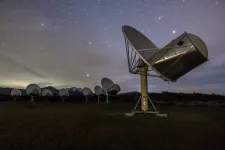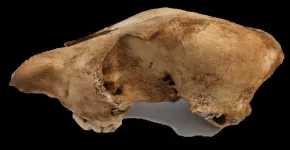(Press-News.org) July 8, 2024, Mountain View, CA – Today, the SETI Institute announced the first projects it will fund with a new program to Support Technology, Research, Innovation, Development, and Education programs – or STRIDE. The SETI Institute established the $500K STRIDE fund for SETI Institute researchers and EOC (Education, Outreach, and Communications) professionals to develop innovative research and education proposals. The first five grants awarded will support projects that:
analyze Earth’s colors and climate to create detectors for studying exoplanets
develop a multi-backend capability for the Allen Telescope Array (ATA) that will speed up scientific progress with the ATA, doubling telescope time
measure dust in Oregon’s dust devils, aiding atmospheric studies on Earth and Mars
enhance ETI signal detection by studying stellar activity impacts on planets around M dwarf stars
introduce a bilingual cartoon series to enrich communications about SETI Institute science and engage diverse audiences
“The STRIDE program is the SETI Institute’s corner of innovation,” said Dr. Nathalie Cabrol, Director of the Carl Sagan Center for Research at the SETI Institute. “It is meant to enable our researchers, educators, and outreach experts to test high-risk/high-impact concepts and dive into the emerging questions in their fields, which is often difficult to achieve within mainstream programs where funding supports defined priorities. STRIDE is a gateway to tomorrow’s new ways of exploring, discovering, educating, and sharing knowledge with the world. The excellence of the selected projects shows that the program is off to a fantastic start!”
STRIDE grants include funding for basic research,technology development, prototyping, equipment and instrumentation, field expedition work, education program development, materials, hardware, software, and more. Last year, the SETI Institute announced a philanthropic gift of $200M from the estate of Franklin Antonio, a visionary supporter and catalyst of the work of the SETI Institute for more than 12 years. Co-founder of communications chip company Qualcomm, Antonio left an extraordinary legacy to enable breakthrough science in the search for intelligent life beyond our world. The Franklin Antonio Bequest funds the STRIDE program, and the SETI Institute expects to solicit it annually.
“Franklin Antonio’s extraordinary bequest to the SETI Institute represents an inflection point in our history,” said Bill Diamond, President & CEO. “Among its more profound impacts is the ability to fund our scientists and professional staff for research and education programs for the first time in our history. These first STRIDE grants will fund innovative and impactful new projects where traditional funding sources might be entirely unavailable.”
Project Highlights:
Dr. Margaret Turnbull:
SETI astronomers will explore what a planet like the Earth would look like through large telescopes like NASA’s Habitable Worlds Observer. Dr. Margaret Turnbull and her collaborators, Dr. Bill Sparks and Dr. Kim Bott will study the colors of the Earth to determine how they reveal the presence of different surfaces and clouds as the planet rotates. They will also use state-of-the-art climate models to examine how the Earth would change if the length of the day were different. The team will develop instrumentation to detect these signals, prototyping a detector that could fit on a small satellite to observe the Earth.
Dr. Sofia Sheikh:
The Allen Telescope Array (ATA) is a cutting-edge radio telescope performing research in SETI and radio astronomy. With the STRIDE grant, the team will install a new server and design software to allow for two or more science projects to be performed simultaneously with the ATA, so long as their targets are in approximately the same patch of sky. This “multi-backend” capability will hugely accelerate the rate of scientific progress and discovery with the ATA, sometimes doubling the available telescope time.
Dr. Lori Fenton:
The STRIDE grant will allow the project team to measure the concentration of dust in dust devils in the Alvord Desert of Oregon. Calibrating instruments have already produced large images and meteorology data sets. This calibration will enable measurements of dust lofting rates in this data set and in future measurements, providing an estimate of how much dust devils contribute to the atmospheric dust budget on Earth. We can then apply this technique to similar measurements of dust devils observed from the Perseverance rover on Mars.
Dr. Vishal Gajjar:
This project addresses the understudied impact of stellar activity on detecting narrowband ETI (extraterrestrial intelligence) signals, particularly those originating from planets orbiting M dwarf stars, which are smaller and dimmer than Earth’s sun. By simulating the effects of these stellar environments and orbital properties on signal distortion, the project aims to significantly enhance the ability to find technosignatures. The research includes creating a public, interactive database to predict signal distortions, improving the sensitivity of radio technosignature searches, and developing advanced AI tools to detect these signals distorted by stellar environments.
Dr. Ann Marie Cody:
Our new STRIDE program aims to enhance the SETI Institute’s communications program by introducing a monthly cartoon series in English and Spanish. The color illustrations will portray aspects of current research at the SETI Institute in a new way. Downloadable black-and-white coloring pages will allow diverse audiences to apply their ideas and colors.
STRIDE grants will fund these projects for one year.
About the SETI Institute
Founded in 1984, the SETI Institute is a non-profit, multi-disciplinary research and education organization whose mission is to lead humanity’s quest to understand the origins and prevalence of life and intelligence in the Universe and to share that knowledge with the world. Our research encompasses the physical and biological sciences and leverages expertise in data analytics, machine learning and advanced signal detection technologies. The SETI Institute is a distinguished research partner for industry, academia and government agencies, including NASA and NSF.
END
SETI Institute awards its first research and education innovation grants
The STRIDE grants enable recipients to test high-risk/high-impact concepts and dive into the emerging questions in their fields
2024-07-08
ELSE PRESS RELEASES FROM THIS DATE:
Study reveals environmental impact of artificial sweeteners
2024-07-08
The human body’s inability to break down sucralose, an artificial sweetener found in many zero-calorie food and drink products, is well established by scientific research. The compound is so stable that it escapes wastewater treatment processing and is in drinking water and aquatic environments.
“We can't break down sucralose, and a lot of microorganisms can't break it down, either, because it's a really tough molecule that doesn't degrade easily. So there are a lot of questions about how it is affecting the environment ...
Ancient dingo DNA shows modern dingoes share little ancestry with modern dog breeds
2024-07-08
DNA from fossilised dingo remains going back 2746 years compared with modern dingoes’
Dingos arrived in Australia more than 3000 years ago
K’gari dingoes have no domestic dog ancestry – they are pure dingo
Co-lead author, paleogeneticist Dr Sally Wasef, from QUT’s School of Biomedical Sciences said this dataset gave a rare glimpse into the pre-colonial genetic landscape of dingoes, free from any mixing with modern dog breeds.
“Consequently, are behaviourally, genetically, and anatomically distinct from domestic dogs,” Dr Wasef said.
“Modern-day dingoes’ ancestors arrived in Australia more than 3000 years ...
New director appointed to lead U.S. Department of Energy’s Jefferson Lab
2024-07-08
NEWPORT NEWS, VA – Jefferson Science Associates, LLC, today announced that Kim Sawyer will become the new director of the U.S. Department of Energy’s Thomas Jefferson National Accelerator Facility, effective Aug. 2.
Sawyer will serve as the lab’s fifth director in its 40-year history. In this role, Sawyer will be responsible for leading all activities in support of the world’s premiere research institution for exploring the nature of matter.
“We are pleased that Kim has been selected to lead Jefferson Lab,” said ...
Almost half of US counties have no cardiologists despite higher prevalence of CV risk factors, mortality
2024-07-08
Disparities in cardiovascular disease outcomes between urban and rural areas continue to widen, yet nearly half of U.S. counties do not have a practicing cardiologist. According to a new analysis published in JACC, the flagship journal of the American College of Cardiology, these counties tend to be more rural and socioeconomically disadvantaged, with a greater burden of cardiovascular disease, thus highlighting deep geographic disparity in access to cardiovascular care.
“While cardiologists are not the only determinants of cardiovascular outcomes, the lack of access to cardiologists in areas with ...
Americans find hospital-at-home care appealing and safe
2024-07-08
Hospital-level care provided in a patient’s own home is appealing to a majority of people for its convenience, comfort and effectiveness, according to a USC Schaeffer Center study.
The study, published in JAMA, found that most survey respondents felt they would recover faster if cared for at home, rather than in the hospital, and that they felt safe being treated at home.
Researchers say their study provides important insights about patient and family preferences as policymakers weigh whether to extend ...
A gut microbe could hold a key to help people benefit from healthy foods
2024-07-08
KEY TAKEAWAYS
In a study involving 50,000+ individuals from around the world, higher gut levels of Blastocystis, a single-celled organism commonly found in the digestive system, were linked to more favorable indicators of health.
People with a healthy diet had higher levels of Blastocystis.
The study, which was conducted by an international team led by investigators at Massachusetts General Hospital, suggests that Blastocystis may play a beneficial role in how diet impacts health.
In an analysis of more than 50,000 individuals from around the world, carriers of gut Blastocystis, a single-celled organism that has been ...
Luther identifying road segments that bisect predicted movement corridors for small priority species in Virginia
2024-07-08
David Luther, Associate Professor, Biology, received funding for the project: “Identifying Road Segments that Bisect Predicted Movement Corridors for Small Priority Species in Virginia.”
The purpose of this study is to advance the work of the legislated Wildlife Corridor Action Plan (WCAP) and meet the intent of an awarded Federal Highway Administration (FHWA) grant by identifying road segments that may pose a high risk or impede movement of select small terrestrial and semiaquatic animal species that are ...
Employees prefer human performance monitors over AI, study finds
2024-07-08
ITHACA, N.Y. - Organizations using AI to monitor employees’ behavior and productivity can expect them to complain more, be less productive and want to quit more – unless the technology can be framed as supporting their development, Cornell University research finds.
Surveillance tools cause people to feel a greater loss of autonomy than oversight by humans, according to the research. Businesses and other organizations using the fast-changing technologies to evaluate employee behaviors should consider their unintended consequences, which may prompt resistance and hurt performance, the researchers say. They also suggest an opportunity to win buy-in, ...
Novel liquid biopsy methodology enables the monitoring of disease evolution in patients with metastatic prostate cancer
2024-07-08
Novel liquid biopsy methodology enables the monitoring of disease evolution in patients with metastatic prostate cancer
Extracellular vesicles shed by prostate cancer cells to the bloodstream contain tumor-derived material that can be used as biomarkers of therapy response and resistance in patients with metastatic disease.
Published today in the journal Cancer Cell, results of a VHIO-led study show that a newly developed liquid biopsy-based approach can monitor tumor gene expression through RNA contained ...
Schrag studying history Of Dulles Corridor Metrorail Project
2024-07-08
Zachary Schrag, Professor, History and Art History, College of Humanities and Social Sciences (CHSS), received funding for the project: “Rail Against Sprawl: A History of the Dulles Corridor Metrorail Project.”
Schrag said, “I am writing the history of the Dulles Corridor Metrorail Project, among the nation’s most ambitious efforts to reshape daily transportation choices. After decades of planning and construction, the project was completed in 2022, extending the Washington ...
LAST 30 PRESS RELEASES:
Hairdressers could be a secret weapon in tackling climate change, new research finds
Genetic risk for mental illness is far less disorder-specific than clinicians have assumed, massive Swedish study reveals
A therapeutic target that would curb the spread of coronaviruses has been identified
Modern twist on wildfire management methods found also to have a bonus feature that protects water supplies
AI enables defect-aware prediction of metal 3D-printed part quality
Miniscule fossil discovery reveals fresh clues into the evolution of the earliest-known relative of all primates
World Water Day 2026: Applied Microbiology International to hold Gender Equality and Water webinar
The unprecedented transformation in energy: The Third Energy Revolution toward carbon neutrality
Building on the far side: AI analysis suggests sturdier foundation for future lunar bases
Far-field superresolution imaging via k-space superoscillation
10 Years, 70% shift: Wastewater upgrades quietly transform river microbiomes
Why does chronic back pain make everyday sounds feel harsher? Brain imaging study points to a treatable cause
Video messaging effectiveness depends on quality of streaming experience, research shows
Introducing the “bloom” cycle, or why plants are not stupid
The Lancet Oncology: Breast cancer remains the most common cancer among women worldwide, with annual cases expected to reach over 3.5 million by 2050
Improve education and transitional support for autistic people to prevent death by suicide, say experts
GLP-1 drugs like Ozempic could cut risk of major heart complications after heart attack, study finds
Study finds Earth may have twice as many vertebrate species as previously thought
NYU Langone orthopedic surgeons present latest clinical findings and research at AAOS 2026
New journal highlights how artificial intelligence can help solve global environmental crises
Study identifies three diverging global AI pathways shaping the future of technology and governance
Machine learning advances non targeted detection of environmental pollutants
ACP advises all adults 75 or older get a protein subunit RSV vaccine
New study finds earliest evidence of big land predators hunting plant-eaters
Newer groundwater associated with higher risk of Parkinson’s disease
New study identifies growth hormone receptor as possible target to improve lung cancer treatment
Routine helps children adjust to school, but harsh parenting may undo benefits
IEEE honors Pitt’s Fang Peng with medal in power engineering
SwRI and the NPSS Consortium release new version of NPSS® software with improved functionality
Study identifies molecular cause of taste loss after COVID
[Press-News.org] SETI Institute awards its first research and education innovation grantsThe STRIDE grants enable recipients to test high-risk/high-impact concepts and dive into the emerging questions in their fields



